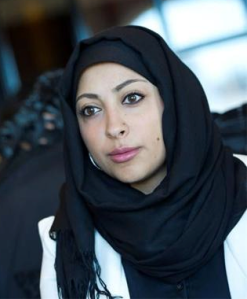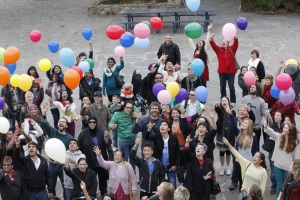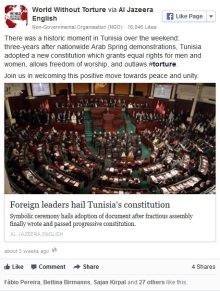Posts Tagged bahrain torture
Detention, imprisonment and torture: The new life of the Al-Khawajas
Posted by World Without Torture in Justice on 04/09/2014
When Maryam Al-Khawaja announced her trip to visit Abdulhadi Al-Khawaja in Bahrain last week, following the recommencement of his hunger strike, all seemed well. The trip was to simply see how her father was faring.
Yet her assessment of his condition never came. In the morning of 30 August, Maryam posted a series of tweets on Twitter outlining how she was immediately detained on arrival with security forces claiming she is “not a Bahraini citizen”:
“I’m denied entry. I’m starting a water-only hunger strike. I won’t voluntarily leave. My only demand is to be let into my country.”

Human rights defender Maryam al-Khawaja spoke to us about the often unseen torture in Bahrain: http://wp.me/p1FGNE-rJ
Since then Maryam has been posting regular updates on her situation, from her declaration of beginning a water-only hunger strike and the snippets of conversations she hears from guards who wish to deport her.
Now, five days after her detention, her Twitter account has changed. A third-party is writing the tweets for her; news is sparse; and the condition of her father, Abdulhadi, must be deteriorating.
Ill-treatment, arbitrary arrests and torture are no distant themes to Maryam, her family and her friends. Maryam and her colleagues – and those associated to those colleagues – have been continual targets for their role in supporting human rights in Bahrain through the criminalised Bahrain Center for Human Rights (BCHR).
A long friend of the IRCT, Maryam has spoken in the past about the appalling human rights record of Bahrain, what the international community needs to do to recognise the abuses and the situation facing her family and friends on a daily basis.
The year 2011 marked the beginning of the now well-documented struggle for the Al-Khawajas. Following several years of banning from the Bahrain state, head of the BCHR Nabeel Rajab (himself only recently released from prison for his role in the centre) and Maryam began travelling the world to speak out about the situation in Bahrain, the vicious crackdowns on protestors and the torture which exists in the Bahrain prison network. It is a story Maryam knows all too well – her father, on hunger strike now, was arrested in April 2011 and sentenced to life imprisonment.
Maryam’s sister Zainab was then targeted and has been subjected to repeated arrest, long-term detention, harassment, and physical abuse, including facing ongoing charges in relation to calling for her father’s freedom. Zainab was released on bail in February 2014, after almost a year’s detention on the oft-cited charges of “insulting the King”, a charge which can lead to seven years imprisonment. Now seven months pregnant, Zainab faces trial again in October. If sentenced she could ultimately give birth inside prison.
Next on the arrest list was Maryam’s long-term friend and colleague Nabeel Rajab. In April 2012, amidst protests to cancel the Bahrain Formula One Grand Prix, Nabeel was arrested and sentenced to prison for having “insulted” Bahraini authorities via Twitter – a landmark ruling at the time as social media dissent had not been punished quite so harshly.
Thankfully Nabeel was released in May 2014, but his experience inside was harrowing. He was beaten, interrogated, left in solitary confinement with a dead animal and stripped naked on many occasions.
It is this prevalent treatment which worries human rights organisations now. Maryam’s father has already undergone major surgery in the past to treat the torture he received in Bahraini jail. And as Maryam told World Without Torture last year, her sister has been a victim of continued harassment, threats and beatings during her time in jail also.
Right now, according to BCHR, Maryam is facing “charges of assault and battery against on-duty public employees during their performance of official duty,” alleging Maryam attacked a lieutenant and another policewoman and injured them when they asked her to hand over her mobile phone at the airport.
Her lawyer has been denied access to her, as have her family. She has been moved to the Isa Town women prison and placed with two convicted criminals.
There is a high degree of urgency in assuring the safety of Ms Al-Khawaja, particularly considering the abuse which her family has suffered in the past.
Maryam’s release must come now. The world is watching.
Creating a world without torture: February in review
Posted by World Without Torture in Advocacy and Influencing Policy, Asia, Europe, From our members, Justice, Middle East North Africa, News & Clippings, Pacific, Prevention, Rehabilitation on 28/02/2014
Despite being the shortest month of our calendar, February has been packed with important news stories, statements and developments across the anti-torture movement.
We summarise some of our most popular blogs, social media content and news releases below. Simply click the relevant links and pictures to read the full stories.
10 questions and answers about torture rehabilitation
Ever wondered what can be achieved through rehabilitation? Ever wanted to know exactly what can be done to help victims of torture overcome their past? Or have you simply questioned how many centres across the globe offer torture rehabilitation services?
This month we collected the top ten questions asked by our readers about anti-torture work and answered them with links to our work. Just click the picture or this link to read more.
IRCT President awarded Council of Europe prize
Another popular story this month came from the IRCT whose President, Suzanne Jabbour, has been awarded the prestigious North-South Prize from the Council of Europe in recognition of her lifelong commitment to preventing torture.
The award, which will be presented this Spring in Lisbon, Portugal, has a long list of famous previous winners including Kofi Annan and Bob Geldof.
Suzanne is overjoyed with her victory and we want to thank everyone who joined us in congratulating Suzanne on this award. Read the full story here.
‘Wheel of Torture’ shows more must be done to stop torture in the Philippines

Detainees can be subjected to torture such as “20 seconds Manny Pacman” which means 20 seconds of nonstop punches. (Courtesy of the Commission on Human Rights)
A prison guard takes a detainee from his or her cell, escorts them to a roulette-style wheel listing different methods of torture, and spins the wheel to determine just how much pain should be inflicted on the prisoner.
This ‘Wheel of Torture’, which uses torture as a game, came to light in the world media this month following an inspection of prisons in the Philippines and shocked human rights groups worldwide.
The practice not only showed us how torture is still being reinvented and adapted in sadistic ways, but also showed just how little is being done in the Philippines to stop torture. You can read our full blog on this, and the statement from human rights defenders in the country, by clicking this link.
‘Act of Killing’ BAFTA victory is important for anti-torture movement
A story we shared on Facebook this month garnered much attention – the vivid, hard-hitting documentary ‘The Act of Killing’ achieved must deserved recognition from the British Academy of Film, Television and Arts (BAFTA) this month, receiving the award for Best Documentary at the latest awards ceremony.
Click our status below to watch an interview with the filmmaker Joshua Oppenheimer following the award.
The challenges facing torture rehabilitation in northern Iraq
We caught up with IRCT member the Kirkuk Center for Torture Victims in Iraq this month to see what they are doing to help survivors of torture in the region.
The newest member of the IRCT movement, the Kirkuk Centre have extensive links across the north of the country to aid victims of torture from all backgrounds, from those affected by the war in Iraq, to the recent influx of Syrian refugees in the region.
It comes as part of our ‘On the Forefront’ series, which you can see all the entries for by clicking this link.
Tunisia passes new constitution
Incredible news from Tunisia this month, who passed a new constitution promoting equal rights for women, freedom of religious expression, and freedom from torture – all ratified just three years after revolution.
We joined world leaders in congratulating Tunisia on this move which will hopefully push other contries to follow the lead.
Click here or the picture for more information.
Change in Bahrain is needed now, not in another three years
However in Bahrain, which also experienced uprisings against the government three years ago, the situation of ill-treatment of protestors and limits to freedom of expression has not changed.
Protests continue on a daily basis, and the three-year anniversary since the beginning of the protests was tragically marked itself by further protests and excessive crackdowns from the authorities.
Bahrain needs to change now. It simply cannot wait any longer. Read the full story by clicking the picture or clicking this link.
For further information from World Without Torture, do not forget to ‘like’ us on Facebook and follow us on Twitter. Click here to visit our Facebook page, and here to visit our Twitter feed.
Change in Bahrain is needed now, not in another three years
Posted by World Without Torture in Advocacy and Influencing Policy, From our members, Justice, Middle East North Africa, News & Clippings, On the Forefront, Prevention, Rehabilitation, Voices on 21/02/2014
Despite a strong government crackdown on protestors, over 300,000 people took to the streets of Bahrain’s capital Manama on 14 February to mark the three-year anniversary of the Bahraini protests.
And despite three-years of torture, imprisonment, and even deaths of protestors, the demonstrations against the government do not seem to be slowing down.
But also what is not slowing down is the government’s resistance to relinquishing power to the people. On the anniversary march alone, over 50 people were injured by rubber pellets and tear gas fired by police.
The last three years have seen the Bahraini government, the House of Al Khalifa, use extreme force over protestors whom are campaigning for respect for human rights. In every protest, the government has repelled the protestors with the use of force. The result over three years is shocking: according to data from The Bahrain Center for Human Rights (BCHR), 93 people have died; more than 2,200 political prisoners remain in detention; and torture and enforced disappearances remain widespread on a daily basis.
The Bahrain Center for Human Rights (BCHR) has tracked the uprising since day one and Maryam Al-Khawaja, Acting President of the BCHR following the arrest of President Nabeel Rajab, knows in detail the harm the government can cause.
Her father, prominent human rights defender Abdulhadi al-Khawaja, has been imprisoned since April 2011 for allegedly plotting a coup during the pro-democracy protests. Maryam’s sister Zainab – who was recently released from detention – still faces a string of ‘anti-government’ charges. They are just two cases out of thousands who have been silenced by the government.
“People seem to assume that somehow the Bahrain revolution failed but I do not think it is fair to assess the revolution as ‘failed’,” said Maryam Al-Khawaja in a piece to World Without Torture. “It is just an inconvenient revolution – a revolution which is happening in a country which is solidly linked to the interests of the West in terms of oil, trading and so on that it would prove problematic to recognise as an active, powerful movement.”
Three years on, her assessment certainly still seems accurate. Aside from the occasional news report online, the world seems oblivious to Bahrain: the country is still portrayed as a safe haven for foreign investment and tourism; and large-scale international events, such as the Formula One Grand Prix, still continue to uphold the myth that Bahrain is free from unrest.
Yet the sheer numbers of protestors marking the importance of the ‘revolution’ tell a different story about the realities of Bahrain: its people want a democratic change from the 230-year-old Al Khalifa rule.
With human rights coming into question on a daily basis, it is a change that is needed – now, not in another three years.
Middle-East’s blind spot: for how long can we ignore Bahrain’s “inconvenient revolution”?
Posted by World Without Torture in Advocacy and Influencing Policy, Justice, Middle East North Africa, News & Clippings, Prevention, Rehabilitation, Voices on 23/10/2013
 Amidst the Copenhagen bustle sits 26-year-old Bahraini human rights defender Maryam al-Khawaja who, on the face of it, appears to be oblivious to her anxieties. These are perhaps the only two minutes to relax from her work at the Bahrain Center for Human Rights.
Amidst the Copenhagen bustle sits 26-year-old Bahraini human rights defender Maryam al-Khawaja who, on the face of it, appears to be oblivious to her anxieties. These are perhaps the only two minutes to relax from her work at the Bahrain Center for Human Rights.
Maryam has just been discussing her father, prominent human rights defender Abdulhadi al-Khawaja, who has been imprisoned since April 2011 for participating in the pro-democracy protests which swept the nation of Bahrain.
Tortured ever since – including beatings so severe he underwent urgent surgery to reconstruct his jaw in 2011 – Abdulhadi’s case looks increasingly desperate. But Maryam manages to distance herself from this well.
“It is another case indicative of the repression exercised by the rulers of Bahrain,” she says flippantly. “In 2011, I wrote a report about a man who had been beaten to the point that no one recognised him.
“I was told at the end of the report that the man who had been tortured was my father. My initial reaction was not to break down but to finish the report. There are so many other torture cases and personalising them does not help my work. You need to normalise it. In my head, most of the time my father is not even in prison.”
But the fact is that along with thousands of other pro-democracy protestors, Maryam’s father, and sister Zainab, wallow in the horrifying conditions of Bahraini prison with little chance of a fair trial or basic human rights.
“There is torture in the prisons,” says Maryam. “The international community focus so much on improving conditions for prisoners when, in reality, these political prisoners should not be detained in the first place. Their release should be called on and they should have assured prison qualities until that point.”
The ‘failed’ revolution?
Yet pressure on the ruling family of Bahrain to accept their shameful human rights record is something which Maryam cynically believes will not be applied by the international community. “People seem to assume that somehow the Bahrain revolution failed but I do not think it is fair to assess the revolution of Bahrain as a ‘failed’ revolution,” she says. “It is just an inconvenient revolution – a revolution which is happening in a country which is solidly linked to the interests of the West in terms of oil, trading and so on that it would prove problematic to recognise as an active, powerful movement.”
We’re talking with each other in the same week that Syria has dominated the news – a humanitarian crisis which has seen millions of people seek refuge in nearby countries.
In this field of vision, Bahrain has become lost. The revolutionary protests which screened all over the world almost three years ago in early 2011 seem long forgotten.
“Bahrain is such a controlled country that now the protests are rarely seen. People are fearful that if they go to the wrong street, or even to the shops in their area, they will be arrested, tear gassed, tortured and so on. They therefore do not have the safety, inclination or room to go into the streets and protest like you would perhaps see elsewhere. And that’s one reason why it does not get coverage. The ruling family of Bahrain know this.”
The Bahraini royal family, the House of Al Khalifa, assumed power approximately 230 years ago and have yet to relinquish it. Indeed half of the current Parliament in Bahrain are aligned to the family and the country’s only unelected Prime Minister, who has been in his position for 43 years, is related to the family also, being the uncle to the current self-declared king, Hamad bin Isa Al Khalifa.
It is this monopolised rule which led to the protests in April 2011 – protests which have, in fact, been occurring regularly since the 1920s’ and before.
Sectarian myth
In the 1950s’ a group called Intifadat al-Haya’a, led by the religious leaders of both the Sunni and Shia communities, started an uprising for civil rights. At this time Bahrain was still a British protectorate so with the help of the British the Bahraini regime crushed this opposition and arrested all of the leading figures..
“The Al Khalifa family knew that if the Sunni and Shia communities stayed united it could spell the end of their rule,” explains Maryam. “So since the 1950s’ the family has been focusing their attention on marginalizing the majority of the country, the Shia community, thereby sidelining their biggest threat. They created this ‘us and them’ fashion through labeling the Shia community more and more, to make it impossible for them to integrate with the Sunni community and, as such, crush any uprising. This is not saying that Sunnis benefit entirely from the Bahrain rulers, because they do not. But it is just one move into the ruling party’s idea to change the demographic of the country so it is majority Sunni rather than Shia.”
This sectarianism is, according to Maryam, just another tool of gaining control by the royal family.
“The family see everyone as an enemy yet portray to Western media that there is a sectarian problem, not a problem between the rulers and the people,” she says.
“It is simply not true. Bahrain is not a sectarian problem. It’s a human rights problem. People, no matter who they are, have no room for freedom of expression, right to safety and so on. People are beaten, tortured and detained on a mass scale – and why? All because they want to exercise their human rights.”
But what can be done to bring change in Bahrain and, in the first instance, call the human rights record of the Al Khalifa family to attention?
International pressure
“You do not need military feet on the ground,” states Maryam. “What you need is pressure on the Bahraini government to accept the evidence we already have, in relation to sanctions against individuals like visa rejections, torture documentation and so on. What you need is for the countries who claim that they promote human rights and democracy to uphold these values – not among their enemies, but among their friends. Bahrain is a friend which is not upholding basic human values, but that would be an embarrassing thing to admit.
“At least in Egypt there is a sphere to go out on the streets and protest. But in Bahrain, public space is controlled in a suffocating manner . In that sense it is not really similar to other protests in the Middle East and is actually more similar to Rwanda – not that there will be a genocide, but there will come a time when something which as been silently bubbling will explode into the open. There is absolutely no room for expression, for freedom of speech or to manoeuvre.”
Fittingly, in the same way I misinterpreted the calmness in Maryam at the coffee shop, it seems Bahrain has a hidden undercurrent of turmoil.
“Everything seems alright and as if changes have been made. But there is always something happening underneath [in Bahrain],” says Maryam. “Distancing ourselves from this turmoil only makes it worse. The time is now for the international community to apply pressure on Bahrain and bring the human rights abuses to light.”
Written by Ashley Scrace, Communications Officer at the IRCT






